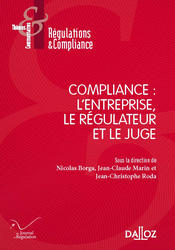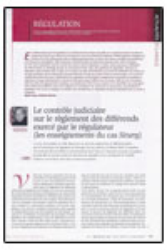Feb. 1, 2024
Teachings

🌐follow Marie-Anne Frison-Roche on LinkedIn
🌐subscribe to the Newsletter MAFR Regulation, Compliance, Law
____
► Full Reference: F. Ancel & M.-A. Frison-Roche, Droit de la compliance (Compliance Law), École nationale de la magistrature - ENM (French National School for the Judiciary), in collaboration with the École de Formation professionnelle des Barreaux du ressort de la cour d'appel de Paris - EFB (Paris Bar School), Paris, February 1 and 2, 2024
This teaching is given in French.
____
____
► Presentation of the Teaching: The aim of this two-day conference is to enable judges and lawyers to grasp the issues, objectives and methods that define Compliance Law as it is practised in companies.
The speakers will illustrate the growing trend towards litigation, which is difficult to reconcile with the supranational dimension, or even indifference to territories, for example when disputes concern systemic climate or digital issues: the result is a renewal of the role of the judge and the role of lawyers.
This must be set against the renewal of the role and operation of companies themselves.
This is analysed from the perspective of Civil Law, in particular Contract Law and Liability Law. Company Law and Criminal Law are also addressed, as well as the way in which the legal system now integrates governance, regulation, climate and digital issues and the smooth operation of financial markets through Compliance techniques.
____
► Organisation of the Teaching: This conference is divided into two parts.
The first day is designed as a presentation of the major themes through which Compliance Law crosses the branches of traditional Law. The speakers will be professors of Law who will successively summarise the branches of Law and put into perspective the way in which Compliance imperatives give rise to new situations, new difficulties and new solutions.
This enables the second day to focus on practical and topical issues and to debate controversial questions between people of different sensibilities. The participants tend to be judges, members of regulatory authorities, lawyers, members of associations and so on.
____
► Enrolment procedure: The course is open to all judicial and consular magistrates, as well as lawyers.
Registrations can be made directly with the ENM or with the EFB.
____
► Speakers :
🎤François Ancel, Judge at the Première Chambre civile de la Cour de cassation (First Civil Chamber of the French Court of cassation)
🎤Thomas Baudesson, Attorney at the Paris Bar, Partner at Clifford Chance
🎤Guillaume Beaussonie, Full Professor at Toulouse 1 Capitole University
🎤Jacques Boulard, Premier Président de la Cour d’appel de Paris (First President of the Paris Court of Appeal)
🎤Marie Caffin-Moi, Full Professor at Paris Panthéon-Assas University
🎤Malik Chapuis, Judge at the Tribunal judiciaire de Paris (Paris First Instance Civil Court)
🎤Lucie Chatelain, Advocacy and Litigation Manager - Civil Liability of Parent Companies, Sherpa
🎤Jean-Benoît Devauges, Directeur Juridique, Ethique et Gouvernance des entreprises (Legal, Ethics and enterprises governance Director), MEDEF
🎤Marie-Anne Frison-Roche, Professor of Regulatory and Compliance Law, Director of the Journal of Regulation & Compliance (JoRC)
🎤Arnaud Gossement, Attorney at the Paris Bar, Partner at Gossement Avocats
🎤Thibault Goujon-Bethan, Full Professor at Jean Moulin Lyon 3 University
🎤Christophe Ingrain, Attorney at the Paris Bar, Partner at Darrois Villey Maillot Brochier
🎤Isabelle Jegouzo, Director of the Agence française anticorruption - AFA (French Anti-Corruption Agency)
🎤Anne-Valérie Le Fur, Full Professor at Versailles Saint-Quentin-en-Yvelines University
🎤Charlotte Michon, Attorney at the Paris Bar, partner at Charlotte Michon Avocat
🎤Jean-Baptiste Racine, Full Professor at Paris Panthéon-Assas University
🎤 Jean-Christophe Roda, Full Professor at Jean-Moulin Lyon 3 University
🎤Jérôme Simon, 1er Vice-Procureur Financier (First Financial Vice-Prosecutor)
____
🧮read below the programme put together and organised by François Ancel and Marie-Anne Frison-Roche, as well as the reports of each presentation⤵️
Oct. 21, 2020
Teachings : Generall Regulatory law

Résumé de la leçon.
Jadis, la Régulation fonctionnait selon un système qui avait le mérite d'être simple, puisqu'il était construit sur une hiérarchie.
Dans le système désormais en place, les pouvoirs s'ajustent entre les institutions politiques et les régulateurs. Mais le jeu ne se limite pas à cela. Les juges sont omniprésents, non seulement comme instruments de contrôle mais encore, voire surtout, comme modèles.
En outre et dès lors, les entreprises ont du mal à trouver leur place. Elles semblent aux deux extrêmes. Ayant quitté celle d'assujetti, elles briguent grâce à l'autorégulation une place très privilégiée. Mais la compliance est la nouvelle donne de la régulation, via la supervision, étant le cœur d'un système où les entreprises sont à la fois débitrices et garantes de l'effectivité des règles de régulation.
L'émergence d'un Droit de la Compliance, qui prolonge le Droit de la Régulation, voire l'amplifie et le transforme en le libérant de ce qui le fît naître, c'est-à-dire le fait même d'un "secteur", est en train de renouveler complètement le rôle de chacun.
___
- Se reporter aux slides.
- Se reporter à la présentation générale du Cours de Droit commun de la Régulation.
- Consulter le Dictionnaire bilingue du Droit de la Régulation et de la Compliance et la Newsletter MAFR - Law, Compliance, Regulation
- Consulter la bibliographie ci-dessous, spécifique à cette Leçon relative à la place de chacun dans le Droit de la Régulation.
May 22, 2018
Thesaurus : Doctrine

Référence complète : Mossé, M., Le juriste au cœur du devoir de vigilance, in Borga, N., Marin, J.-Cl. et Roda, J.-Cl. (dir.), Compliance : l'entreprise, le régulateur et le juge, Série Régulations & Compliance, Dalloz, 2018, pp. 215-225.
Lire une présentation générale de l'ouvrage dans lequel est publié l'article.
Consulter les autres titres de la Série dans laquelle est publié l'ouvrage.
Nov. 15, 2017
Thesaurus : Doctrine
► Référence complète : Le Gac-Pech, S., Le nouvel art de juger : quand la proportionnalité s'invite dans la mise en œuvre de la règle de droit, Revue Lamy Droit civil, nº 153, 2017.
March 27, 2015
Publications

The cost issue of regulation is a recurring issue.
One can complain specifically, when companies are protesting about the "cost of regulation" or when the topic is taken as an object of study, through the cost / benefit calculation.
A practical question of importance is whether there is a "legal question" or not.
The "juridicity" of a question is defined by the fact that discussing about this question has an effect on the outcome of a case before a judge. This concrete definition, leaving the judge's power, binding nature of the rule (here the balance between cost and benefit) the effectiveness of its decision before the judge, its consideration by him in the decision he makes, has been proposed in France by Carbonnier. It is opposed to a definition of Law by the source, the author of the rule, which identifies law for example through Parliament Acts, because the text is adopted by the legislator, listed source of law.
The first definition, more sociological, more flexible, giving the spotlight on judge better corresponds to a legal system which gives more room for ex post and for the judge. It is logical that we find more demonstrations of this conception in the common law systems.
However, the issue of cost / benefit is being debated before the Supreme Court of the United States, about the latest environmental regulations, adopted by the Environment Protection Agency (EPA). It is a question of law. It is under the empire of the judge.
For it is in this light that President Barack Obama in November 2014 asked a very costly regulation, and it was under his leadership that the Environmental Protection Agency has developed texts. Indeed, pollution of certain plants are the cause of asthma and laid in public health imperative to fight a regulation that results in a direct cost on firms. Indeed, some plants pollution is the cause of asthma and President Obama has asked public health imperative to combat by a regulation that results in a direct cost on the industry. The regulations adopted in 2012 they cost a $ 9 million, some claiming that future ones could result in billions of costs directly related to business The President emphasized by stating that the health of children was priceless.
By challenging those of 2012 before the Supreme Court, in the case Michigan v. EPA, this is the other texts that conservative states and companies have in mind because it is the principle that is posed: : does A regulator have the right to take regulations very "expensive" when the advantage, however legitimate it is, is small-scale in terms of costs? The Supreme Court, having chosen to handle the case, listened to March 25, 2015, the arguments of each other and discussed the case.
The question is the integration or not into the constitutional notion of "necessity of the law" of the "cost / benefit" calculation. This is a crucial point because the concept of "necessity of the law" is a common notion to the constitutions of many countries.
However, not only the so-called judges "conservatives" as Justice Antonio Scalia, took position felt it was crazy not "consider" the cost of new regulations from the expected health benefits, but also Justice Stephen Breyer called "progressive," said "irrational" the environmental regulator has not taken in consideration such an imbalance between cost and benefit.
It is true that Justice Breyer was formerly professor of competition law at Harvard.
Judgment will be given in June.
Feb. 9, 2005
Publications

Référence complète : FRISON-ROCHE, Marie-Anne, Le contrôle judiciaire sur le règlement des différends exercé par le régulateur (les enseignements du cas Sinerg), Revue Lamy Concurrence, n°3, mai/juillet 2005, pp.107-110.
June 27, 2000
Publications
► Référence complète : J.-F. Burgelin, J.-M. Coulon et M.-A. Frison-Roche, "L’office de la procédure", in Mélanges offerts à Pierre Drai, Le juge entre deux millénaires, Dalloz, 2000, p.253-267.
____
____
► Résumé de l'article : l'article a pour objet de revenir à ce à quoi sert la procédure, quel est donc son "office", l'office du juge ne pouvant pas être que de juger mais portant aussi vers ce qui le mène à cet acte-là, c'est-à-dire la procédure, laquelle ne devant pas être davantage séparée de ce qui l'a fait mettre, à savoir le litige. Si la procédure en est totalement séparée, alors elle devient proprement folle, comme elle le devient si l'on oublie que la procédure est un instrument qui se conçoit que par rapport à son utilité. L'autonomie du Droit processuel ne contrarie en rien cet ancrage.
A ce titre et dans une première partie, l'article examine la façon dont la procédure concrétise les prérogatives des parties que la procédure protège. La procédure permet aux parties de reconstituer les faits qu'elles construisent et pour l'allégation desquels elles apportent des preuves dans les formes procéduralement admises, le juge pouvant intervenir par un tour procédural inquisitorial pour que la preuve du fait allégué soit apportée.
Par ailleurs, procès correspond à une triade constituée par les deux parties et le juge, la procédure suppose que les deux parties acceptent le principe même du droit de l'autre à lui parler et à utiliser les mêmes formes, la procédure étant de ce fait une civilisation du conflit qui est tout à fois mis à distance par le cérémonial et calmé par le codage : la procédure a pour office d'imposer un lien civilisé entre les parties, elle incarne en cela la justice elle-même. A ce titre, l'opposition souvent faite entre l'accusatoire et l'inquisitoire doit être relativisé car la procédure inquisitoire peut être plus protectrice de ce lien, notamment par les droits de la défense.
La seconde partie de l'article expose l'office de la procédure dans la perspective de l'efficacité du service public de la justice. La procédure efficace fait disparaître le litige, ce que fait le jugement, puisque celui-ci tranche le litige. En cela, le jugement n'est pas un acte de procédure commensurable aux autres et il faut qu'il arrive dans un délai raisonnable. C'est pourquoi le juge doit avoir des pouvoirs importants, comme l'injonction, y compris dans une procédure accusatoire, et favoriser les modes alternatifs, comme la médiation.
De la même façon, le procès doit s'ouvrir aux tiers, notamment parce que la distinction des intérêts s'estompe et que l'intérêt collectif ou général doit être entendu.
________